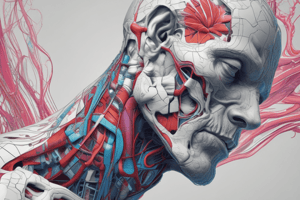Podcast
Questions and Answers
What is the main function of the nervous system?
What is the main function of the nervous system?
to control body functions, interpret, and respond to stimuli
What is the role of the circulatory system?
What is the role of the circulatory system?
to transport oxygen, nutrients, and waste products throughout the body
What is the main function of the skeletal system?
What is the main function of the skeletal system?
to provide support, protection, and movement to the body
What is the direction term for 'above' or 'upper'?
What is the direction term for 'above' or 'upper'?
What is the main function of the integumentary system?
What is the main function of the integumentary system?
Flashcards are hidden until you start studying
Study Notes
Organ Systems
- Nervous system: controls body functions, interprets and responds to stimuli
- Central nervous system (CNS): brain, spinal cord
- Peripheral nervous system (PNS): nerves, sense organs
- Circulatory system: transports oxygen, nutrients, and waste products
- Heart: pumps blood throughout the body
- Blood vessels: arteries, veins, capillaries
- Respiratory system: brings oxygen into the body, removes carbon dioxide
- Lungs: exchange oxygen and carbon dioxide
- Trachea, bronchi, diaphragm: facilitate breathing
- Digestive system: breaks down food into nutrients
- Mouth: mechanical and chemical digestion
- Esophagus: food passage
- Stomach: chemical digestion
- Small intestine: nutrient absorption
- Large intestine: water absorption, waste elimination
- Endocrine system: produces hormones to regulate body functions
- Glands: pituitary, thyroid, adrenal, pancreas, gonads
- Integumentary system: protects the body from external damage
- Skin: epithelial tissue, sweat glands, sebaceous glands
- Hair, nails, exocrine glands: accessory structures
- Muscular system: moves the body, maintains posture
- Skeletal muscles: voluntary movement
- Smooth muscles: involuntary movement (e.g., digestive tract)
- Cardiac muscles: heart contractions
- Skeletal system: provides support, protection, and movement
- Bones: 206 bones in the adult human skeleton
- Joints: connect bones, allow for movement
- Immune system: defends the body against pathogens
- Lymphatic system: produces, transports, and stores immune cells
- Spleen: filters blood, stores immune cells
- Urinary system: removes waste and excess fluids
- Kidneys: filter blood, regulate electrolyte balance
- Ureters: carry urine from kidneys to bladder
- Bladder: stores urine
- Urethra: carries urine out of the body
Body Regions
- Head: cranial cavity, face, skull
- Neck: cervical region
- Thorax: chest cavity, lungs, heart
- Abdomen: digestive organs, abdominal cavity
- Back: vertebral column, spinal cord
- Upper limb: arm, forearm, hand
- Pelvis: hip bones, sacrum, coccyx
- Lower limb: thigh, leg, foot
Directional Terms
- Anatomical position: standing upright, feet shoulder-width apart
- Superior: above, upper
- Inferior: below, lower
- Anterior: front, ventral
- Posterior: back, dorsal
- Medial: towards the midline
- Lateral: away from the midline
- Proximal: near the point of attachment
- Distal: far from the point of attachment
Studying That Suits You
Use AI to generate personalized quizzes and flashcards to suit your learning preferences.



